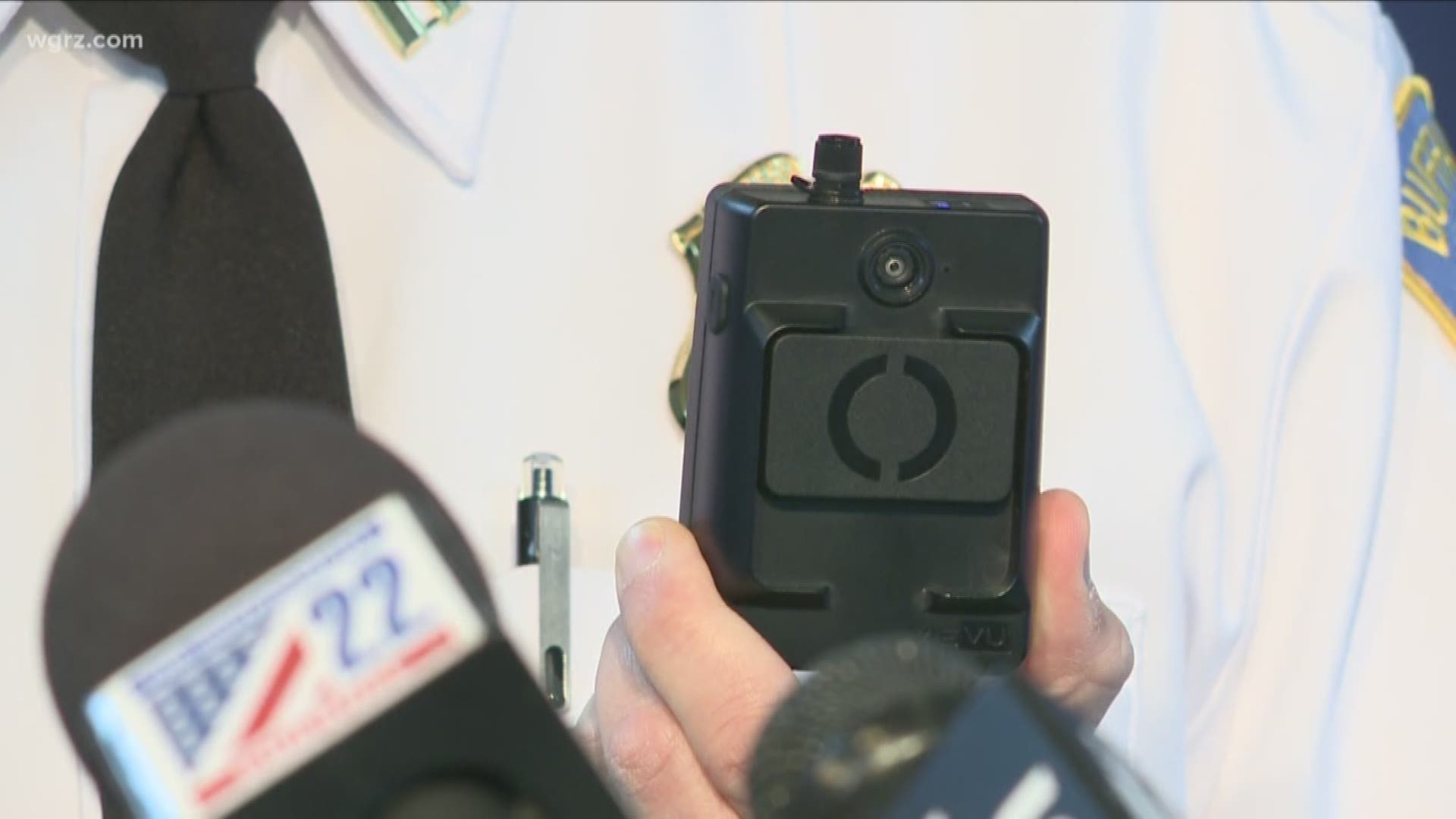BUFFALO, N.Y. — BUFFALO, N.Y. - The input gathered from a community meeting in Buffalo could potentially change the policy which governs how police officers will use body cameras.
The meeting took place at the Frank Merriweather Library on Jefferson Avenue, Wednesday at 5:30 pm.
The Common Council's Police Advisory Board plans to use the public input, from people who live and work in the city, in discussions with police in the coming days.
Police have a draft version of their body camera policy, which we're told they're willing to amend before the rollout of the body camera program in about six weeks.
The PAB consists of city residents who make recommendations to the Buffalo Police Department and Council on how to improve community-police relations. Jonathan Manes, the Co-Chair of the PAB, explains that the community meeting is meant to inform the public about the body cameras and the draft policy. He says their input on this program is critical, so that the board can advocate on the public's behalf.
"I think most people are in favor of the body cams," said Manes. "We've heard a lot of support. But there's lots of details about how it's going to be implemented."
Buffalo Police will begin rolling out their body camera program, starting with B-District. About 100 patrol officers will be equipped with body cameras and trained how to use them.
Over the next year, the approximately 350 remaining patrol officers across the city will go through the same process. Every patrol officer will get their own camera.
The PAB met with BPD about two weeks ago to discuss where the program stands. The PAB had concerns about certain policy items, such as when the cameras should be recording, how the video will be stored, and who can have access to the footage.
"It seems like, right now at least, the police department isn't prepared to be releasing footage, even in instances when the public interest is strongest," explained Manes. "When there are credible allegations of police misconduct, use of force, etc."
The way the draft policy is written now, police will be responsible for turning on the cameras while engaged in police activity. Because of the cost for video storage, Captain Jeff Rinaldo, BPD spokesperson, says having an officer record the entire time they are on duty would be cost prohibitive.
After the initial cost of purchasing the body cameras, setting up storage, and upgrading the internet connections at the various districts; the program will cost Buffalo taxpayers approximately $1 million a year to maintain. We're told 75% of that figure is for data storage.
"Our policy calls for (officers) to turn their cameras on any call for service," explained Capt. Rinaldo. "So, if they get dispatched to a call, the camera goes on. The camera doesn't come off until after the call for service, until the call is rectified. If the officer is going to take any form of enforcement action, meaning they're not called somewhere but they decide 'I'm going to pull a car over for a traffic stop. I'm going to investigate a suspicious person. I'm going to engage in police activity.' They have to activate the camera."
But the draft policy does allow police officers to use their own discretion in certain circumstances.
"The discretion comes when they're walking down the street and somebody says 'Hi, officer, can I talk to you?'" explained Rinaldo. "We're not trying to discourage community interaction because, as much as the people feel that the police don't like to be recorded, a lot of the public doesn't like to be recorded, also."
Rinaldo added, "There's privacy concerns regarding hospitals, and locker rooms, and sex crime victims, and juveniles, and certain conditions. We cannot record those activities."
The policy state that victims can also ask police officers to stop recording.
In an case where police officers don't use the body cameras, they will have to fill out a form documenting the reason why.
In terms of who can view the video recordings, Rinaldo says their policy state that any video of criminal acts will not be publicly accessible because it would be considered evidence.
Right now, there are two potential body camera vendors BPD is considering. They have narrowed down contract talks with one of the vendors, but Rinaldo would not disclose the name of the vendor saying the vender hasn't been notified that they were awarded the contract.
The police body camera program in Buffalo is estimated to roll out in early to mid-January because of processing of insurance documentation and contract finalization. BPD assures residents that the program is definitely happening, and that amendments to the policy will not delay the launch date.
Capt. Rinaldo states the only things that could potentially delay the start date of the program are shipment of equipment and training time for the officers.
"There's a considerable amount of training that goes into the use of the camera, but also policies, procedures, and all the back end work that is required to then obtain the video in a format that's usable."
For those who missed the community meeting can still send their questions or feedback to BPD via phone, e-mail, or social media.
The final policy, once accepted, will be posted on BPD's website.

